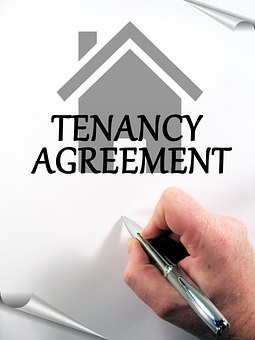Whether you are a tenant or a prospective tenant, there are a number of information you need to be acquainted with in your relationship with the landlord (or prospective landlord) in other to ensure you know your rights and obligations as well as your limits. Amongst these are:

1. Tenancy Agreement may be oral or written.
A landlord and tenant may enter into a valid tenancy arrangement notwithstanding the absence of an express written contract, i.e., tenancy agreement. In order words, tenancy agreement may be oral or written; or partly oral or partly written. However, it is advisable that a tenant should ensure that a tenancy agreement is put in writing because written contracts are easier to prove and enforce than oral contracts. Having said that, a tenant should endeavour to study the written agreement before signing.
2. Make sure everything is documented.
In addition to ensuring that a written tenancy agreement is drawn and duly executed, a tenant should ensure that he takes pictures of the rented premises/apartment before moving in as well as subsequent repairs and improvements carried out in agreement with the landlord. Every important discussion and further agreements with the landlord should be documented by ensuring that there is a follow up correspondence confirming what was said and agreed. This will make matters of proof easier when required.
3. A tenant must ensure he pays rent or something of value.
Although the absence of payment of rent does not generally mean a tenancy arrangement does not exist, yet, it is better for the tenant to ensure that rent is paid and receipt of payment obtained from the landlord. This will weaken any opportunity the landlord may have to argue that the tenant was a mere licensee all along. Needless to say that a licensee does not enjoy all the rights of a tenant as he is said to occupy premises by mere permission of the landlord.
4. A tenant has the right to exclusive possession of premises.
Perhaps this appears to be the most important of all the rights of a tenant and the highest proof of tenancy. What this means is that a tenant has the right to occupy and use the rented premises to the exclusion of the landlord and third parties. He is entitled to quiet and peaceful enjoyment of the premises. He has the right to privacy and freedom from all forms of unlawful interference by the landlord. The landlord may only be permitted to inspect the rented premises at a given time upon a written notice. The tenant has the right to sue the landlord if he breaches this all important right.
5. Consider the length of notice for termination of tenancy in the agreement before execution.
Firstly, note that both the landlord and the tenant has an obligation to serve a notice of termination of tenancy when either party is no longer interested in continuing with the tenancy. Thus, although in majority of the cases, it is a landlord who moves to terminate the tenancy by the issuance of the widely detested “notice to quit” or “quit notice” (inadvertently called “quick notice” by some), the tenant has equal right to terminate the tenancy by serving the landlord a notice stating so. This tenant’s notice is not a notice to quit but a notice of termination.
Most importantly, the length of notice to be given by either the landlord or the tenant depends primarily on what the tenancy agreement stipulates. It is only when the tenancy agreement is silent on this that recourse would be had to the provisions of the law regarding notice. Many tenants make the mistake of assuming, for instance, that a yearly tenant must be entitled to a six-month notice from the landlord. No. Where the tenancy agreement provides that the length of notice shall be, say, one-month, then the landlord would be right to issue a notice to quit asking the tenant to vacate premises in a month time. Therefore, it is important that the tenant studies the tenancy agreement especially the clause on length of notice. It is only where the tenancy agreement does not provide for length of notice that the length prescribed by law would operate. In which case, the law generally provides for instance that where there is no stipulation as to notice in the tenancy agreement, a yearly tenant would be entitled to a six-month notice.
6. A tenant is bound to pay for the period of occupation of premises even when served with a Notice to Quit.
There is this common thinking amongst tenants that whenever a landlord serves a notice to quit, then payment of rent automatically stops. This is an erroneous assumption. A tenant is bound to pay for every day he spends on the premises and even compensation if he holds over. Thus, if the rent paid by a yearly tenant was to expire in say, 31 December, 2018 and the landlord issues him a notice to quit premises by 31 March, 2019, the tenant may opt to leave the premises by 31 December, 2018 in which case he owes the landlord nothing. Where however he decides to vacate the premises after 31 December, 2018 and say by 31 March, 2019, the landlord is entitled to receive money for the 3 months extra period the tenant was in occupation. This money is technically called mesne profits. The landlord has the right to recover this.
7. Not every tenant is entitled to notice to quit.
There is what is known as “tenancy for a term certain”. Tenancy for a term certain (or fixed term) is a tenancy arrangement where the tenant is granted a lease of premises for a definite period and the tenancy automatically expires at the end of the period. Parties ordinarily understand that at the expiration of the period, the tenancy is over. Of course, the agreement may provide a clause for renewal of the tenancy but that does not make it to be anything more or less than what it is. This kind of tenancy is more common to non-residential apartments. Persons who take it up always do so for a specific purpose like the lease of a warehouse for offloading of goods. In the case of a periodic tenancy (common to residential premises and offices), the tenancy does not automatically expire at the end of the period. The tenancy is taking to continue while the tenant is obliged to renew his rent by making payment in advance. Although this does not imply that a tenancy for a fixed term cannot be taken with respect to residential premises. At all times, it is a function of properly construing and understanding the terms of the tenancy agreement and the surrounding circumstances to determine the true nature of the tenancy.
Importantly, it is to be noted that tenants who take up tenancy for a fixed term are not entitled to notice to quit. Rather, the only obligation of the landlord is to issue a seven-day notice of landlord’s intention to recover premises.

8. A tenant must not deny his landlord’s title.
Title here does not refer to chieftancy title or academic title. What is meant here is that a tenant must not deny or challenge his landlord’s title to the premises which is subject of tenancy either by claiming absolute ownership of the property, joint ownership with the landlord or by asserting that a third party is his landlord. A tenant who does this is liable to forfeit his term.
9. A tenant should endeavour to obtain written consent of the landlord before subletting premises.
In the absence of any written law (like Section 7(6) of the Lagos State Tenancy Law 2011) or express written provision in a tenancy agreement prohibiting subletting, a tenant may be free to sublet. Usually, however, tenancy agreements contain a clause prohibiting subletting and the tenant must observe and abide by it. Nevertheless, a tenant may endeavour to negotiate for a better modified clause which reserves the right of a tenant to sublet but with the written consent of the landlord which consent must not be unreasonably withheld in the case of a respectable and responsible person (prospective subtenant).
10. Consult a lawyer.
As a tenant, consulting with a lawyer before taking a lease of a property is quite necessary so as to ensure that you get the best bargain and that you are well informed of the provisions of the tenancy agreement you would eventually execute. Subsequent to taking up the lease, it is advisable to seek timely legal opinion regarding any point of disagreement with your landlord. Always opt for an amicable resolution of disputes in deserving cases. In Lagos for instance, we have the Citizen Mediation Centre and Lagos Multi-Door Court House. Seek lawyers with sound mediation advocacy skills to assist you. Where however a court action best serves your interest in order to protect your rights and obtain remedies, your lawyer would promptly inform you accordingly.














